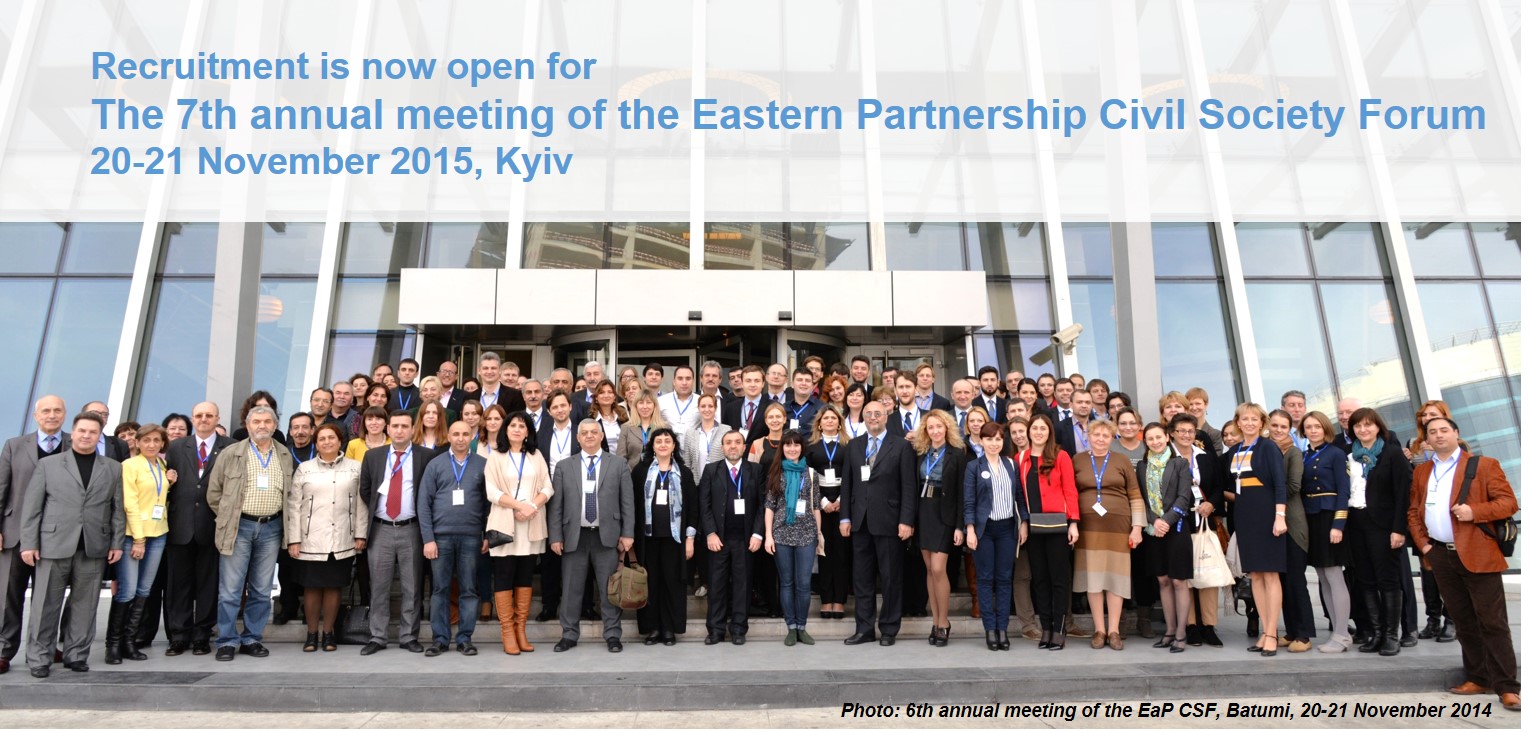|
IN THE SPOTLIGHT |
Eastern Partnership Civil Society Forum
|
|
Invitation to submit expressions of interest to participate in the 7th annual meeting of the Eastern Partnership Civil Society Forum (Kyiv, Ukraine, 20-21 November 2015)The Steering Committee of the EaP Civil Society Forum is now inviting all interested parties to submit expressions of interest to participate in the 7th annual meeting of the Eastern Partnership Civil Society Forum. The submission of expressions of interest is a necessary step in the selection process to participate in the EaP CSF annual meeting to take place on 20-21 November in Kyiv, Ukraine.
The annual meeting of the Eastern Partnership Civil Society Forum (EaP CSF) is the key event conducted on an annual basis since 2009. It is the highest decision making-body in the EaP CSF which also serves as a platform for a debate on the achievements of the Forum and the EaP in general and on civil society contribution to the reform process in the region. Every year the event brings together over 200 civil society representatives from the EaP region as well as the EU and other stakeholders. WHO CAN APPLY? The Civil Society Forum is open to a wide range of CSOs: NGOs, think-tanks, non-profit foundations, trade unions, employers' organisations, professional associations, chambers of commerce, business associations, national and international CSOs/networks and other relevant civil society actors from EaP region, but also from EU Member States and international organisations. Only one person per organisation can apply. The civil society organisations dealing with women's issues/rights are encouraged to apply. The organisations are encouraged to delegate women as their representatives to the annual meeting of the Forum. Participants will be selected on the basis of the following criteria:
The organisations that can fund their own participation or willing to attend the annual assembly in the capacity of an observer (without voting rights) also need to apply. The CSF Steering Committee in consultation with the European External Action Service/European Commission will carry out the selection of the participants for the 7th annual meeting of the EaP CSF. The selection procedure will be twofold. To learn more about the selection procedure please follow the link. The deadline for the applications is 12:00 (midnight) (CET), 25 May 2015. To apply for the 7th annual meeting, please complete the application form in English or Russian. If you have any questions concerning the call for applications, please send them to support@eap-csf.eu. If you wish to work on a copy of this form offline, a Word document is available for you in English and Russian. Please note that all answers must still be submitted via online form. IMPORTANT NOTICE: The European Union (EU) will be able to fund the travel and hotel accommodation during the Forum meeting for the selected CSOs only. It will be possible for the EU to cover the travel and accommodation of up to 170 CSO representatives – a maximum of 120 from the EaP countries and a maximum of 50 from EU member states. It should be noted that the European Commission does not cover costs of the participation of observers in the Forum's activities.
[1]Working Groups: WG1 Democracy, Human Rights, Good Governance & Stability, WG2 Economic Integration and Convergence with EU legislation WG3 Environment, Climate Change & Energy Security, WG4 Contacts between People, WG5 Social & Labour Policies and Social Dialogue [2] WG1 subgroups: 1. Public administration sub-group 2. Visa facilitation sub-group 3. Election monitoring reform sub-group 4. Human rights sub-group 5. Fight against corruption sub-group 6. Media freedom sub-group 7. Judiciary reform sub-group 8. Regional cooperation and confidence building; WG2 subgroups: 1. Environment & Climate Change 2. SME Policy 3. Agriculture & Rural Development 4. Transport 5. Trade and Trade Regulated Cooperation linked to DCFTAs 6. Territorial, regional and cross border cooperation 7. Integration of ICT infrastructure in the EU; WG3 subgroups: 1. Environmental Governance 2. Energy Security 3. Climate change 4. Biodiversity 5. Sustainable Development; WG4 subgroups: 1. Youth 2. Culture 3. Education 4. Contacts between seniors; |
Project funded by the European Union
![]()








